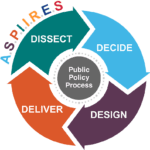A.S.P.I.I.R.E.S. Policy Review Framework FAQ
After a yearlong pilot with five states, Ed Trust produced the A.S.P.I.I.R.E.S policy review framework, with the support of the Lumina Foundation. Here, you can find out what our framework is and how to use it.
What is the Ed Trust A.S.P.I.I.R.E.S policy review framework?
It’s a simple tool that state policy officials can use to see how well their policies are reaching education and training goals for different groups of students. It’s designed with higher education policy officials in mind, but policy officials can use the framework to review progress toward any public policy goal.
The framework is a series of prompts:
Asking a clear question. Here’s a model: “How well is policy (x) working for population (y) with respect to policy goal (z)?”
Setting up the review
Performing research
Interpreting results
Identifying objectives based on results
Recommending policy design and delivery changes to reach the objectives
Executing on recommendations and commitments
Scouting to see how well the changes are working
Each prompt is illustrated with an example from Kentucky, one of the states we’ve learned a lot from.
Throughout, the framework encourages state officials to identify any disparities in opportunities and outcomes across groups of students — including students of color and students from low-income backgrounds — and to recommend changes to policy design or policy delivery to address these disparities.
Where did the Ed Trust A.S.P.I.I.R.E.S policy review framework come from?
It emerged from a) a review of established models of the public policy process; b) a review of how state governments audit the outcomes of their policies; and c) a yearlong pilot, supported by Lumina Foundation, with five states: Colorado, Hawaii, Kentucky, Louisiana, and Massachusetts.
What’s the typical public policy model, and how does the A.S.P.I.I.R.E.S policy review framework fit in?

The typical public policy model includes several steps, including agenda setting, policy formulation, policy adoption, policy implementation, and policy evaluation.
We offer a simplified version:
- Decide on policy goals
- Design the policy
- Deliver the policy
- Dissect it to see how well the framework is working
The A.S.P.I.I.R.E.S policy review framework is one tool state officials can use to dissect — in other words, to review, audit, or evaluate — their policies to see how well they’re working.
According to the Texas Politics Project, “Policy making is a cyclical process…Analysis [dissection] of policy effectiveness often reveals shortcomings in formulation [design] or implementation [delivery] or new problems to add to the policy agenda [decisions].”
We agree. The framework incudes two graphics that illustrate this cyclical nature: one for the overall public policy process and one for the A.S.P.I.I.R.E.S policy review framework itself.
Reviewing policies takes time and resources, and state agencies are already stretched too thin. Is A.S.P.I.I.R.E.S. worth it?
Yes, it’s worth it. States have big goals for boosting the share of the population with college degrees and other credentials. If policies aren’t getting results for students of color, students from low-income background, and others, states won’t reach their goals. By reviewing how well policies are working, and for whom, states can see where to keep going in the same direction and where to course correct.
Here’s one example on A.S.P.I.I.R.E.S. in action:
Kentucky officials gathered data and talked to students and other stakeholders to understand how well colleges have been helping students get their basic needs met. The project team identified a substantial “SNAP Gap” – big differences between the number of students likely eligible for federal nutrition support and the number of students receiving it. And they observed disconnects between information published on college websites and supports available on campus. When Kentucky education officials briefed Kentucky human services officials on these findings, the human services officials committed to placing “kynectors” – Kentucky public employees responsible for increasing awareness and uptake of public benefits programs – at Kentucky public colleges. If Kentucky hadn’t carried out the policy review, they wouldn’t have known that so many students are unnecessarily struggling with food security, threatening college persistence and completion, and they wouldn’t have collaborated to bring kynectors to colleges.
I’m a state official interested in the A.S.P.I.I.R.E.S policy review framework. How do I get started?
Visit edtrust.org/aspiires to scroll through the framework and read the examples. Sign up to be the first to receive more information — including more detailed case studies of state policy reviews in Kentucky and other states, and other tools and templates to help with the Set up— as it becomes available.
I’m a state official. I have questions or I’d like help implementing the A.S.P.I.I.R.E.S policy review framework. What can I do?
Great! Please contact us here. Ed Trust is available to advise state officials on the A.S.P.I.I.R.E.S policy review framework, as well as developing and advancing specific policies for improving higher education opportunity and outcomes for students of color and students from low-income backgrounds. Our experts include former state and federal policy officials, policy researchers, and communications and advocacy specialists.
I’m an education advocate who wants to encourage state officials to use the A.S.P.I.I.R.E.S policy review framework. Any suggestions?
So glad you asked! Once you scroll through and sign up, share the framework with state officials and suggest which policy questions to ask. Offer to help with the policy review(s), whether by providing analytical support or stakeholder input in the research phase, or co-designing recommendations based on the results. And get in touch let us know how we can help you help them.
We’d like to co-host a webinar or session for our staff, members, or stakeholders about the A.S.P.I.I.R.E.S policy review framework. How can we connect with Ed Trust to make that happen?
Thank you! Please contact us so we can make a plan together. Ed Trust can offer brief sessions to overview the framework and/or provide training and coaching for going deeper.
